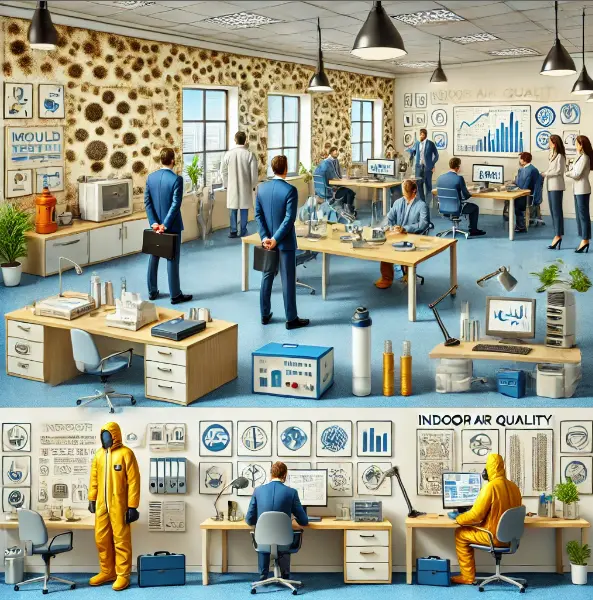The Impact of Mycotoxins in Business Environments - The Mould Group

The Impact of Mycotoxins in Business Environments
Business premises, especially older buildings, are prime environments for mould growth. This mould often produces mycotoxins, toxic compounds that become airborne and can enter the respiratory system. According to the Australian Institute of Health and Welfare, approximately 1 in 10 Australians suffer from respiratory illnesses each year, and exposure to indoor pollutants like mycotoxins is a significant contributing factor. Additionally, indoor air quality problems are responsible for 50% of all respiratory issues, making this a pressing concern for both employers and building managers.
The effects of mycotoxin exposure vary but can range from mild symptoms like skin irritation and nasal congestion to severe conditions such as chronic respiratory issues and immune system dysfunction. People with pre-existing conditions like asthma are particularly vulnerable. Research indicates that employees working in environments with compromised air quality have a 30% higher absenteeism rate. This absenteeism has direct financial repercussions on businesses, with a study by the CSIRO estimating that poor indoor air quality costs the Australian economy over $12 billion annually in lost productivity and healthcare expenses.
Mycotoxins and Legal Liabilities
The lack of awareness about mycotoxins in Australia is a serious issue, putting businesses at risk of legal consequences. Employers are legally obligated to maintain a safe work environment under the Work Health and Safety (WHS) Act. Failure to address hazards like mould and mycotoxins can lead to substantial fines or legal action.
A 2022 report from Safe Work Australia highlighted a worrying 15% increase in workplace compensation claims related to hazardous substance exposure, including cases linked to poor air quality. Furthermore, businesses found to be in violation of WHS regulations could face fines of up to $600,000 or even imprisonment for individuals responsible.
In a recent case in Sydney, a company was fined $80,000 after several employees developed respiratory issues traced back to unchecked mould in the office building. This highlights the financial and reputational risks businesses face if they neglect indoor air quality and mycotoxin management.
Signs Your Business May Have a Mycotoxin Problem
Recognizing a potential mycotoxin issue early can prevent more significant problems down the line. Here are some indicators to watch for:
- Visible Mould Growth: Even small patches of mould can suggest a larger, hidden issue within the building structure. According to a study by the Environmental Health Association, 70% of mould infestations are more extensive than they initially appear.
- Persistent Musty Odours: A constant musty or damp smell is a common indicator of mould growth, which can produce mycotoxins.
- Health Complaints: Frequent reports from employees experiencing respiratory symptoms, headaches, fatigue, or allergic reactions could point to a mycotoxin issue. Research shows that 20% of employees exposed to mycotoxins report long-term health problems.
- History of Water Damage: Buildings that have experienced flooding, roof leaks, or plumbing issues are at a higher risk for mould infestations. A study by the University of Melbourne found that 60% of buildings with water damage eventually develop mould.
The Importance of Mould Testing for Businesses
Conducting thorough mould testing is the only way to confirm the presence of mycotoxins and assess their concentration levels. Professional inspections use air and surface sampling to identify mould types and their potential health risks. The Mould Group provides cutting-edge testing services designed for commercial properties, utilising advanced technology to deliver accurate results.
Data from the Indoor Air Quality Association suggests that businesses investing in regular air quality assessments can reduce health-related employee absences by up to 25%. Furthermore, a 2019 survey indicated that businesses that addressed indoor air quality issues saw a 15% increase in employee productivity. This makes mould testing not only a safety measure but also a strategic investment in your workforce.
How Mycotoxin Exposure Affects Business Operations
The presence of mycotoxins doesn’t just pose health risks; it can also significantly impact your business operations. Reduced employee productivity, higher sick leave rates, and potential legal claims all add to the financial burden. According to the World Green Building Council, improving air quality can boost productivity by up to 11%, while poor air quality can result in a 5-10% decrease in overall performance.
For example, in a large office setting with 200 employees, a 5% drop in productivity equates to a loss of around $300,000 annually, assuming an average salary of $75,000 per employee. These figures underscore the importance of addressing mycotoxin exposure not just as a health issue but as a financial imperative.
Preventive Measures to Protect Your Business
Prevention is always better than dealing with the aftermath of a mycotoxin infestation. Here are some practical steps to safeguard your business:
- Improve Ventilation: Proper airflow can help control moisture levels and prevent mould growth. According to the National Institute for Occupational Safety and Health (NIOSH), buildings with well-maintained ventilation systems have a 40% lower risk of mould-related issues.
- Regular Maintenance: Quickly address any leaks or water damage. The American Society of Heating, Refrigerating and Air-Conditioning Engineers (ASHRAE) notes that timely repairs can reduce mould risk by up to 80%.
- Educate Employees: Encourage staff to report any signs of mould or air quality issues. Providing training on how to identify potential hazards can be invaluable.
Partner with The Mould Group for Expert Solutions
The Mould Group is committed to helping businesses across Australia create safe, healthy work environments. Our specialised mould testing and remediation services are tailored to the unique needs of commercial properties. With years of experience and advanced technology, we can quickly and effectively address mycotoxin concerns.
Connect to the Full Series
This article concludes our series on understanding mycotoxins and their impact. If you haven’t already, read Understanding Mycotoxins: The Hidden Threat in Your Home to gain a comprehensive view of how these toxins affect residential properties. Together, these articles provide a holistic understanding of the importance of proactive mould and mycotoxin management.

